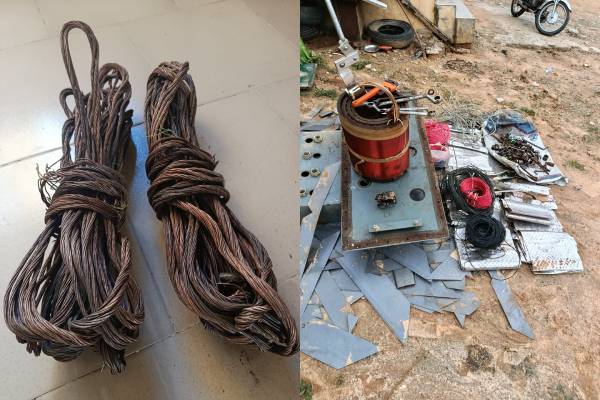In a bold move to revitalize Nigeria’s oil and gas industry, the Nigerian National Petroleum Company Limited (NNPC) has initiated high-level discussions with Petrobras, Brazil’s state-owned oil giant, to attract fresh investments into the country. This development, announced recently, signals Nigeria’s renewed commitment to strengthening its position as a leading oil-producing nation in Africa while addressing longstanding challenges in its energy sector. The talks, which are at an early stage, aim to explore potential partnerships, joint ventures, and technology transfers that could unlock new opportunities for both nations in the global energy market.
The announcement comes at a critical juncture for Nigeria, which has faced significant hurdles in sustaining its oil production capacity and attracting foreign direct investment (FDI) into its energy sector. Declining oil output, aging infrastructure, regulatory uncertainties, and security concerns in the Niger Delta have all contributed to Nigeria’s struggle to maintain its status as Africa’s top oil producer. Against this backdrop, the engagement with Petrobras represents a strategic effort by the NNPC to leverage international expertise and capital to rejuvenate the sector.
Background: Nigeria’s Oil and Gas Industry in Context
Nigeria’s economy has long been heavily dependent on its oil and gas sector, which accounts for approximately 90% of the country’s export earnings and a significant portion of its government revenue. With proven oil reserves estimated at 37 billion barrels and natural gas reserves exceeding 200 trillion cubic feet, Nigeria holds immense potential as a global energy hub. However, the country has struggled to fully capitalize on these resources due to a combination of structural, operational, and policy-related challenges.
In recent years, Nigeria’s oil production has fluctuated between 1.2 and 1.8 million barrels per day (bpd), significantly below its capacity of over 2.5 million bpd. Factors such as pipeline vandalism, oil theft, and underinvestment in upstream exploration and production have constrained output. Additionally, the slow implementation of the Petroleum Industry Act (PIA) of 2021, which was designed to reform the sector and create a more investor-friendly environment, has led to delays in unlocking the full potential of Nigeria’s hydrocarbon resources.
The global energy transition has further complicated Nigeria’s position. As the world shifts toward renewable energy and decarbonization, oil-producing nations like Nigeria face increasing pressure to diversify their economies while maximizing the value of their fossil fuel assets. This dynamic has made it imperative for Nigeria to attract reliable partners capable of injecting capital, technology, and expertise into its oil and gas industry.
The Petrobras Connection: A Strategic Partnership in the Making
Petrobras, formally known as Petróleo Brasileiro S.A., is one of the world’s leading integrated oil and gas companies, with a strong track record in deepwater exploration, production, and refining. Headquartered in Rio de Janeiro, Brazil, Petrobras has developed significant expertise in offshore oil and gas operations, particularly in the pre-salt fields of the Santos Basin, which have positioned Brazil as a major player in the global energy market. The company’s success in leveraging advanced technologies and innovative practices makes it an attractive partner for Nigeria, which has vast untapped offshore resources.
The discussions between NNPC and Petrobras are centered on exploring collaborative opportunities in upstream, midstream, and downstream segments of the oil and gas value chain. While specific details of the talks remain confidential, sources indicate that the partnership could involve joint exploration and production projects in Nigeria’s deepwater blocks, technology transfers to enhance operational efficiency, and potential investments in refining and petrochemical infrastructure. Such a collaboration could significantly boost Nigeria’s oil production capacity, create jobs, and stimulate economic growth.
Why Petrobras?
Petrobras’s interest in Nigeria aligns with its strategic goal of expanding its global footprint and diversifying its portfolio beyond Latin America. The company has a proven ability to operate in challenging environments, including deepwater and ultra-deepwater fields, which are similar to Nigeria’s offshore assets. Nigeria’s deepwater blocks, located in the Gulf of Guinea, are among the most promising in Africa, with fields such as Egina, Bonga, and Akpo holding substantial reserves. However, these fields require significant capital investment and technical expertise to develop, areas where Petrobras has demonstrated competence.
Moreover, Petrobras’s experience in navigating regulatory complexities and engaging with local stakeholders in Brazil could prove invaluable in Nigeria, where bureaucratic hurdles and community relations have often hindered project execution. By partnering with Petrobras, the NNPC aims to tap into this expertise to streamline operations and attract additional foreign investors to Nigeria’s oil and gas sector.
The Broader Implications of the Partnership
The potential partnership between NNPC and Petrobras carries significant implications for Nigeria’s energy sector and its broader economy. Below are some key areas where the collaboration could make a transformative impact:
1. Boosting Oil Production and Revenue
One of the primary objectives of the NNPC-Petrobras talks is to increase Nigeria’s oil production capacity. By leveraging Petrobras’s expertise in deepwater exploration and production, Nigeria could unlock new reserves and optimize existing fields. This would not only boost oil output but also generate additional revenue for the government, which is critical at a time when Nigeria is grappling with fiscal challenges, including rising debt levels and a growing budget deficit.
Increased oil production would also enhance Nigeria’s ability to meet its OPEC production quota, which has been a challenge in recent years due to operational constraints. A revitalized oil sector could restore Nigeria’s position as Africa’s leading oil producer, potentially surpassing Angola, which has recently outpaced Nigeria in output.
2. Technology Transfer and Capacity Building
A key component of the proposed partnership is the transfer of technology and knowledge from Petrobras to Nigerian stakeholders. Petrobras’s advanced drilling techniques, reservoir management practices, and environmental sustainability measures could help modernize Nigeria’s oil and gas operations. This would not only improve efficiency but also reduce the environmental footprint of oil exploration and production activities, aligning with global best practices.
Furthermore, the partnership could facilitate capacity building for Nigerian engineers, geologists, and other professionals in the oil and gas industry. Training programs, technical exchanges, and joint research initiatives could empower local talent and reduce Nigeria’s reliance on expatriate expertise over time.
3. Strengthening Downstream Operations
Nigeria’s downstream sector, particularly its refining capacity, has long been a weak link in its oil and gas value chain. Despite being a major oil producer, Nigeria imports a significant portion of its refined petroleum products due to the underperformance of its state-owned refineries. The NNPC has been working to rehabilitate its refineries in Port Harcourt, Warri, and Kaduna, while also supporting private initiatives such as the Dangote Refinery, which is expected to be one of the largest in the world.
Petrobras’s expertise in refining and petrochemicals could play a pivotal role in supporting Nigeria’s efforts to achieve self-sufficiency in petroleum products. A potential collaboration could involve investments in upgrading existing refineries or developing new facilities, which would reduce Nigeria’s dependence on imported fuel and save billions of dollars in foreign exchange.
4. Attracting Additional Foreign Investment
The NNPC-Petrobras partnership could serve as a catalyst for attracting other international oil companies (IOCs) to Nigeria. In recent years, several IOCs, including Shell, Chevron, and ExxonMobil, have scaled back their operations in Nigeria, citing regulatory uncertainties and unfavorable fiscal terms. A successful collaboration with Petrobras could demonstrate Nigeria’s commitment to creating a more investor-friendly environment, encouraging other companies to re-evaluate their engagement with the country.
The implementation of the Petroleum Industry Act (PIA) is expected to further enhance Nigeria’s attractiveness to investors by providing clearer regulations, competitive fiscal terms, and improved governance in the oil and gas sector. The NNPC’s proactive engagement with Petrobras signals to the global investment community that Nigeria is open for business.
5. Addressing Energy Security and Transition Goals
As the world transitions to cleaner energy sources, Nigeria faces the dual challenge of maximizing the value of its oil and gas resources while investing in renewable energy and sustainable practices. A partnership with Petrobras, which has made strides in balancing fossil fuel production with environmental responsibility, could help Nigeria navigate this complex landscape. For instance, Petrobras has invested in carbon capture and storage (CCS) technologies and renewable energy projects, which could serve as a model for Nigeria as it seeks to align with global climate goals.
Additionally, increased oil and gas revenue from the partnership could provide the financial resources needed to fund Nigeria’s energy transition initiatives, such as solar, wind, and hydrogen projects. This would support Nigeria’s commitments under the Paris Agreement and its broader goal of achieving net-zero emissions by 2060.
Challenges and Risks
While the potential benefits of the NNPC-Petrobras partnership are significant, several challenges and risks must be addressed to ensure its success. These include:
1. Regulatory and Policy Uncertainty
Despite the passage of the PIA, Nigeria’s oil and gas sector continues to face regulatory uncertainties that could deter investors. Inconsistent policies, delays in licensing rounds, and disputes over fiscal terms have historically undermined investor confidence. The NNPC and the Nigerian government must work to ensure a stable and transparent regulatory framework to support the partnership with Petrobras.
2. Security Concerns in the Niger Delta
The Niger Delta, where much of Nigeria’s oil and gas infrastructure is located, has been plagued by security challenges, including militancy, oil theft, and vandalism. These issues have disrupted operations and increased the cost of doing business in Nigeria. Addressing these security concerns will be critical to creating a conducive environment for Petrobras’s investments.
3. Global Energy Market Dynamics
The global oil market is characterized by volatility, driven by factors such as geopolitical tensions, demand fluctuations, and the ongoing energy transition. Nigeria must navigate these dynamics carefully to ensure that its partnership with Petrobras remains viable in the long term. For instance, a sustained decline in global oil prices could impact the profitability of new investments.
4. Local Content and Community Engagement
Ensuring that the partnership delivers tangible benefits to local communities and adheres to Nigeria’s local content policies will be essential. Petrobras must work closely with the NNPC and local stakeholders to ensure that projects create jobs, support local businesses, and address community concerns. Failure to do so could lead to resistance from host communities, as seen in previous oil and gas projects.
The Road Ahead
The NNPC’s engagement with Petrobras marks a significant step toward revitalizing Nigeria’s oil and gas sector and positioning the country as a competitive player in the global energy market. However, the success of this partnership will depend on the ability of both parties to navigate the complex challenges of Nigeria’s operating environment while delivering mutual benefits.
In the short term, the NNPC and Petrobras are expected to continue their exploratory talks, with a focus on identifying specific projects and investment opportunities. These discussions could lead to the signing of memoranda of understanding (MoUs) or joint venture agreements in the coming months. The NNPC has also indicated that it is open to engaging with other international partners to further diversify its portfolio and accelerate the development of Nigeria’s energy sector.
For Nigeria, the stakes are high. A successful partnership with Petrobras could unlock billions of dollars in investments, create thousands of jobs, and strengthen the country’s position as a leading energy producer. It could also serve as a model for future collaborations with other global oil companies, helping Nigeria overcome its longstanding challenges and achieve its full potential as an energy powerhouse.
Conclusion
The NNPC’s decision to open talks with Petrobras reflects a forward-thinking approach to addressing the challenges facing Nigeria’s oil and gas industry. By leveraging Petrobras’s expertise, technology, and capital, Nigeria has an opportunity to revitalize its energy sector, boost its economy, and position itself for long-term success in a rapidly evolving global energy landscape. While significant hurdles remain, the potential rewards of this partnership make it a critical initiative for Nigeria’s future.
As the talks progress, stakeholders in Nigeria and beyond will be closely watching to see how this collaboration unfolds. If successful, the NNPC-Petrobras partnership could mark a turning point for Nigeria’s oil and gas industry, ushering in a new era of growth, innovation, and prosperity.






